|
|
|
Sort Order |
|
|
|
Items / Page
|
|
|
|
|
|
|
| Srl | Item |
| 1 |
ID:
148297
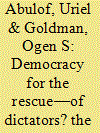

|
|
|
|
|
| Summary/Abstract |
Intrastate conflicts, long eclipsing interstate conflicts, are often internationalized. This paper examines internationalized intrastate conflicts through the types of both the intervening and the embattled regimes. Do democracies, more or less than autocracies, support autocratic governments in their fights against rebels? This paper tests three hypotheses: (1) democracies support autocrats fighting rebels less than autocracies do. (2) Democracies support democratic governments fighting against rebels more than autocracies do. (3) The more democratic two states are, the higher the probability one would support the other’s fight against rebels. Covering all documented external support in intrastate wars (1975–2000), our findings support hypothesis one and two only partly and confirm hypothesis three. However, comparing the two major accounts of the Democratic Peace theory (DPT)—the normative and the structural—our findings corroborate only the former robustly. The paper thus helps enriching the insights of the DPT beyond interstate conflicts.
|
|
|
|
|
|
|
|
|
|
|
|
|
|
|
|
| 2 |
ID:
149899
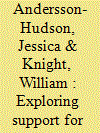

|
|
|
|
|
| Summary/Abstract |
The development of shale gas in the United Kingdom (UK) using hydraulic fracturing, more commonly known as ‘fracking’, remains in its infancy. Yet understanding public attitudes for this fledgling industry is important for future policy considerations, decision-making and for industry stakeholders. This study uses data collected from the University of Nottingham, UK nationwide online survey (n=3823) conducted in September 2014, to consider ten hypothesises about the UK public's attitudes towards shale gas. From the survey data we can see that 43.11% of respondents support shale gas extraction in the UK. Furthermore, our results show that women, class DE respondents, non-Conservative party supporters, and respondents who positively associate shale gas with water contamination or earthquakes are less likely to support the extraction of shale gas in the UK. We also discuss potential policy implications for the UK government arising from these findings.
|
|
|
|
|
|
|
|
|
|
|
|
|
|
|
|
| 3 |
ID:
147051
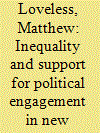

|
|
|
|
|
| Summary/Abstract |
Existing studies of income inequality and political participation—including related literature, for example, on preferences for redistribution—leave us with the question of whether citizens see political democracy as offering ways to challenge market inequalities. Using original surveys in 13 Central and Eastern European countries, I find that those who see high and undesirable levels of income inequality have stronger demands for popular democratic participation than those who do not. In addition, neither the aggregate levels of support for political engagement nor individuals’ perceptions of inequality are coordinated with either national-level indicators of income inequality or democratic performance.
|
|
|
|
|
|
|
|
|
|
|
|
|
|
|
|
| 4 |
ID:
111889
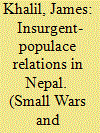

|
|
|
|
|
| Publication |
2012.
|
| Summary/Abstract |
The first objective of this article is to provide conceptual clarity regarding the term 'support' in the context of insurgent campaigns. While it is commonly claimed that insurgent and counterinsurgent forces compete for the support of the populace, there is often ambiguity as to whether this refers to a voluntary preference for a group of armed actors (attitudinal support), or a set of actions that provide direct benefits to one of these groups (behavioural support or collaboration). Furthermore, while a number of academics and practitioners focus upon the former on the assumption that it translates into the latter with sufficient consistency (Lawrence 'of Arabia', Mao, etc.), others maintain a contradictory stance (Kilcullen, Kalyvas, etc.). The findings from research undertaken into the 1996-2006 conflict in Nepal suggest a more complex reality in that certain forms of collaboration (e.g. provisions of information) seemingly necessitate supportive attitudes to a greater extent than others (e.g. supplies of food). The second objective is to evaluate the various approaches used by the Maoist insurgents to generate these distinct forms of support. While their ideology largely failed to resonate with the populace, attitudinal support was obtained through various 'popular appeals', including land reform, an opposition to an increasingly repressive monarchy, and campaigns to empower certain marginalised sectors of society. In contrast, the development initiatives of the Maoists, and their nationalist rhetoric in opposition to US and Indian influence were substantially less effective. Each of these initiatives were undertaken to obtain collaboration via attitudinal support, but the former was also generated directly through the use of coercion against specific non-combatants.
|
|
|
|
|
|
|
|
|
|
|
|
|
|
|
|
| 5 |
ID:
171507
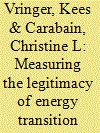

|
|
|
|
|
| Summary/Abstract |
In line with the Paris Agreement, the Dutch Government aims to achieve 49% CO2 emission reduction by 2030. The required energy transition will have a large impact on Dutch society. So, it is important that citizens and companies support and agree on the required policies. This paper explores the legitimacy of these policies and how to measure the degree of such legitimacy.
A survey among Dutch citizens and company representatives shows support for the emission reduction policy goals (input-legitimacy). We also explored support for two specific policy interventions (output legitimacy): 1) an ‘in-home display’, collectively paid for by all energy consumers, and 2) an in-home display that is paid for by the energy companies. Both interventions are supported by around 50% of the citizens and companies. We found strong correlations between underlying aspects of legitimacy (related to good governance criteria) and the overall support for the interventions. We also found that public support for a policy goal does not automatically result in support for the associated intervention. This emphasizes the importance of ex-ante testing of specific interventions to determine the level of public support, so that policy can become more effective and efficient.
|
|
|
|
|
|
|
|
|
|
|
|
|
|
|
|
| 6 |
ID:
110823
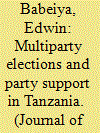

|
|
|
|
|
| Publication |
2012.
|
| Summary/Abstract |
Multiparty elections in Tanzania have been characterized by the dominance of the ruling party and the erratic rise and fall of opposition parties. This trend has been largely influenced by, among others, such factors as institutionalization, age, personality sex, history and low level of civic competence. However, the results of the 2010 general elections suggest a new development that challenges the eminence of the aforementioned factors, which have for almost two decades favoured the ruling party. This new development is reflected in the 2010 elections that witnessed some of the areas that were an enclave of the incumbent party offering a relatively strong support to opposition parties, particularly Chama Cha Demokrasia na Maendeleo (CHADEMA). The 2010 general elections' results prompt a need for an enquiry to establish whether or not this is the beginning of a new chapter in which both the ruling party and opposition parties stand an equal chance of winning the elections.
|
|
|
|
|
|
|
|
|
|
|
|
|
|
|
|
| 7 |
ID:
126570
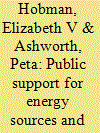

|
|
|
|
|
| Publication |
2013.
|
| Summary/Abstract |
Increasing public awareness and understanding of alternative energy sources and related technologies is an essential component of informed decision-making regarding new options of generating energy for a low carbon future. The current study examined the influence of psychological factors (i.e., pro-environmental beliefs, and subjective norms) and the provision of factual information on public support for a range of energy sources and related technologies. A representative sample of 1907 Australians completed an on-line survey that measured perceptions of a range of climate change and energy issues. Results showed that support for renewables is stronger than support for traditional fossil-fuel based energy sources (i.e., coal or gas) or nuclear energy. The provision of factual information about generation cost and emissions significantly changed support ratings, particularly when cost information was provided. Regression analyses revealed that pro-environmental beliefs were significantly related to support ratings for alternative energy sources. Subjective norms, however, were the strongest positive explanatory factor, suggesting that social mechanisms may be key drivers of support for new and emerging energy sources and related technologies.
|
|
|
|
|
|
|
|
|
|
|
|
|
|
|
|
| 8 |
ID:
142740
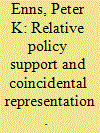

|
|
|
|
|
| Summary/Abstract |
The finding that the preferences of middle-income Americans are ignored when they diverge from the preferences of the rich is one of the most widely accepted and influential conclusions in political science research today. I offer a cautionary note regarding this conclusion. I demonstrate that even on those issues for which the preferences of the wealthy and those in the middle diverge, policy ends up about where we would expect if policymakers represented the middle class and ignored the affluent. This result emerges because even when middle- and high-income groups express different levels of support for a policy (i.e., a preference gap exists), the policies that receive the most (least) support among the middle typically receive the most (least) support among the affluent (i.e., relative policy support is often equivalent). As a result, the opportunity of unequal representation of the “average citizen” is much less than previously thought. The analysis also shows, however, that substantial opportunity exists for unequal representation of strong partisan preferences. Together, these results reinforce the importance of party identification for understanding policy outcomes and who gets represented.
|
|
|
|
|
|
|
|
|
|
|
|
|
|
|
|
| 9 |
ID:
185257
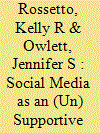

|
|
|
|
|
| Summary/Abstract |
The current study explored how romantic partners of active-duty service members perceived social media as (un)supportive when dealing with military lifestyle challenges. This study also explored coping and support paradoxes as they play out when military partners are using social media to help them cope. Twenty-four partners (female, n = 22; male, n = 2) participated in interviews. Participants reported mostly using Facebook (e.g., spouse groups) for dealing with military lifestyle challenges. Supportive functions included seeking and providing support and relational maintenance and development. Unsupportive functions included reinforced boundaries and support breakdowns. Findings are discussed with a focus on communal coping and coping and support paradoxes.
|
|
|
|
|
|
|
|
|
|
|
|
|
|
|
|
| 10 |
ID:
184196
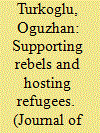

|
|
|
|
|
| Summary/Abstract |
Why do some countries host more refugees than others? Previous research has focused on the role of geographical, political, and economic determinants, and little attention has been paid to civil conflict dynamics. In this article, I examine how a host country’s support for rebel groups may affect the number of refugees that it accommodates. Countries that support rebels host a higher number of refugees than others, as accommodating refugees can be the continuation of that support and help rebel groups in their armed struggle. By hosting people, countries may offer a sanctuary from which rebels can operate some of their insurgent activities. Rebel groups can exploit these camps for recruitment, training, and benefiting from the main services such as health care. In addition, when rebels operate in host countries, these countries may monitor, impact, or even direct the strategies of insurgent groups. Analysis of refugee flows between 1968 and 2011 suggests that countries which support rebel groups host twice as many refugees as others. Results are robust to various model specifications, two different sources for the main explanatory variable, matching analysis, and additional checks. Findings of this article highlight the importance of conflict dynamics in explaining the variation in refugee flows
|
|
|
|
|
|
|
|
|
|
|
|
|
|
|
|
| 11 |
ID:
191005
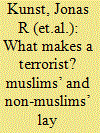

|
|
|
|
|
| Summary/Abstract |
The question of why people become terrorists has preoccupied scholars and policy makers for decades. Yet, very little is known about how lay people perceive individuals at risk of becoming terrorists. In two studies conducted in the U.K., we aimed to fill this gap. Study 1 showed that Muslims and non-Muslims perceived a potential minority-group terrorist in terms of both structural (e.g., life-history, social) and individual risk factors (e.g., personality, psychopathology, ideology). In Study 2, Muslims and non-Muslims perceived a potential right-wing majority-group terrorist as having more individual predispositions to terrorism than a potential left-wing majority-group terrorist. Importantly, in both studies, individualist perceptions such as psychopathology were positively associated with support for stricter law enforcement, whereas structuralist perceptions such as adverse childhood experiences were positively associated with support for social interventions. Lay people seem to have multifactorial understandings of individuals at risk of becoming terrorists, which influence their counterterrorism policy support.
|
|
|
|
|
|
|
|
|
|
|
|
|
|
|
|
|
|
|
|
|